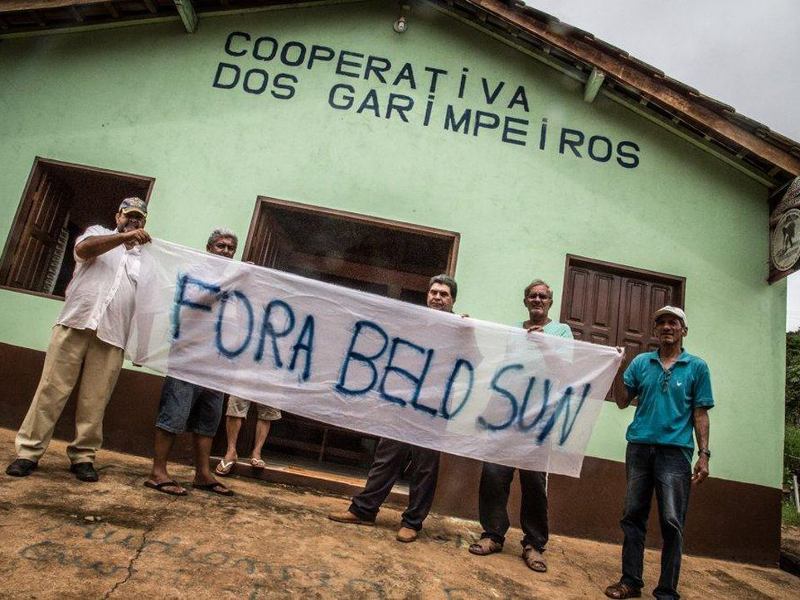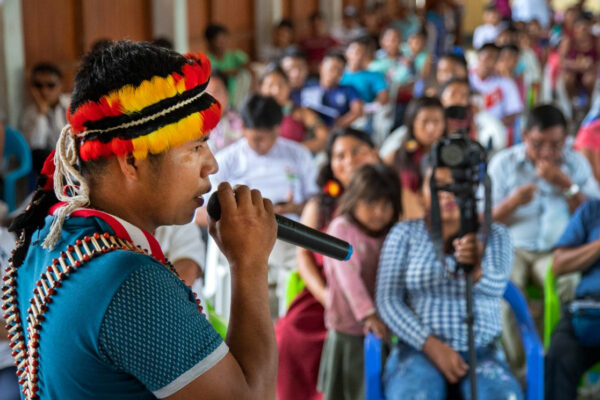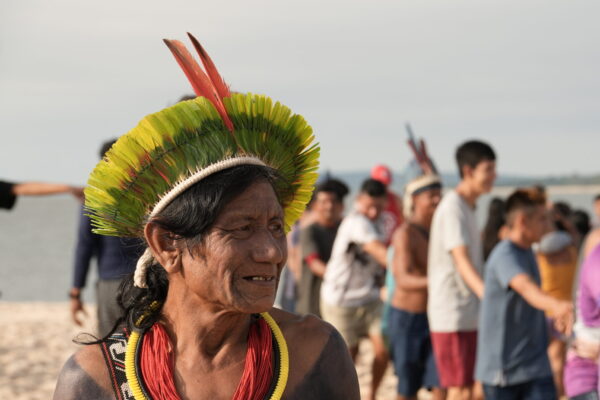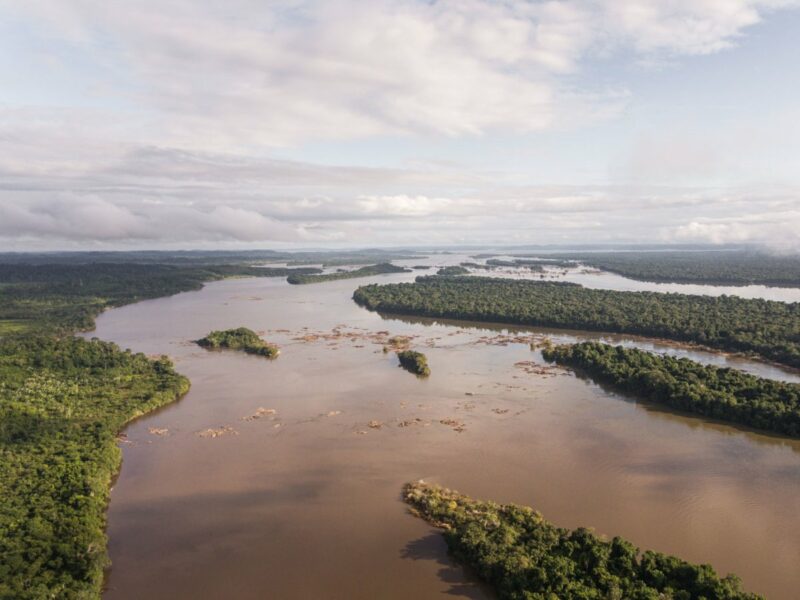On the morning of the annual Carnival in Rio de Janeiro, in February 2017, a group of samba dancers stood solemnly in front of a massive parade float depicting five venomous snakes, their forked tongues protruding from the back of a bearded man with bloodshot eyes.
The gruesome display was a publicity stunt – a symbol of agribusiness invading the eastern edge of the Amazon rainforest, said the dancers in a press conference that morning. To the delegation of Indigenous leaders in attendance, the monster allegorized several industrial projects recently encroaching on their territories.
For some, it represented the Belo Monte, a massive government-owned hydroelectric dam that flooded the shores of the lower Xingu River, a tributary to the Amazon River. For one delegate, the leader of the Juruna tribe, the monster represented a more recent perceived threat to the communities living near those shorelines – a Canadian mining company by the name of Belo Sun.
“We can’t accept Belo Sun in our region, not in Brazil,” tribe leader Bel Juruna told the thousands of carnival-goers in attendance that day. “We demand that this company leave us alone on our lands, that the government respects us and respects our nature.”
For years, the Toronto-based firm has sought licence to build Brazil’s largest open-pit gold mine, called the Volta Grande, on the southern shore of a 500-km curve in the Xingu. But the Juruna and critics alike have said that the mine would spell disaster for the surrounding ecosystem and Indigenous communities if it’s approved by the Brazilian government.
In particular, activists opposed to mining in the Amazon have long expressed concern over the Volta Grande’s expected use of toxic chemicals like cyanide for gold processing – a common concern among protestors of large-scale mining developments – and say it’s too soon to build in a region where the impacts of the Belo Monte dam, a project approximately 20 km away, have yet to be fully realized. According to court rulings, the company has repeatedly failed to adequately consult the surrounding Indigenous communities on the proposal, leading a federal judge to condemn the company’s actions as “a serious violation of environmental legislation and Indigenous rights” in 2013.
Opposition to the building of the mine in the Xingu region continues at a time when Indigenous communities in the Amazon are growing increasingly susceptible to the effects of rampant development and deforestation that have surged under Brazil’s right-wing government led by President Jair Bolsonaro.
Belo Sun began field research on the Volta Grande mining territory, stretching across the lush outback and rolling hills of the State of Para, in 2008. The company received its first regulatory licence in 2010. The current mining area occupied by the company is over 1,600 square kilometres – more than twice the size of Toronto.
For Belo Sun, a company with a market capitalization of $212 million, the Volta Grande is a business-defining project. If approved, the mine would allow for the extraction of hundreds of millions of tons of gold from the land’s volcanic greenstone rock over the span of 17 years. The company anticipates an average gold production of 205,000 ounces per year, which, at current gold prices, is valued at more than $303 million (U.S.) annually. They estimate construction would cost roughly $298 million (U.S.) to complete.
But the project was temporarily halted by federal courts in Brazil twice after lawsuits were launched by prosecutors and regional government agencies responsible for Indigenous and environmental affairs. In 2013, the mine was put on hold on the grounds that the company had failed to study the impact of the mine on local Indigenous populations. In 2017, not long after the parade in Rio, its installation licence was suspended when a judge ruled that further investigation was warranted into allegations of illegal purchases of land and dispossession of the populations living on those lands by preventing them from hunting and fishing, according to court documents.
In total, federal and regional prosecutors have filed six lawsuits against Belo Sun since the company received its first licence.
To move ahead with construction, Belo Sun now needs approval from a federal court after completing a federally mandated Indigenous Study, which the company said will be finished by the end of the year.
Christian Poirier, a spokesperson for Amazon Watch, said the rulings demonstrate why the Volta Grande shouldn’t be completed.
“There are many little communities that exist in these areas, and the imposition of massive projects like (the Volta Grande) will hurt them,” he told the Star. “A mine of this scale in a country that has such horrible safety standards in terms of its mining regulations would be absolutely catastrophic, especially in an ecosystem so damaged already.”
Peter Tagliamonte, the Canadian CEO of Belo Sun, disagrees. He said the project will maintain rigorous safety standards and will be beneficial to bringing economic development and employment to the area.
“Preservation of the environment is important to all of us and it was a very important consideration as we designed the Volta Grande Project,” Tagliamonte wrote to the Star in a statement. He said the project won’t take from or discharge water into the Xingu River, but rather will accumulate rainwater and “utilize evaporation.”
He said the mining operation will create 800 direct jobs and 2,400 indirect jobs related to the project. The mine will pay a 1.5 per cent royalty on all gold production to the Brazilian government, over half of which will go directly to the local municipality of Senador José Porfirio, where the mine is located, and in total, Tagliamonte estimates that the mine will pay $800 million (in Brazilian currency) in taxes over its lifespan.
While U.S.-based mining companies are known to settle in Toronto’s financial district, Belo Sun is largely a Canadian operation. The firm’s executives are composed of former engineers and corporate lawyers from groups such as SNC-Lavalin and CIBC. Tagliamonte, a graduate of the University of Western Ontario’s Ivey Business School, previously served as president and CEO of Sulliden Gold Corp. and Central Sun Mining before taking the helm of Belo Sun in 2014.
In light of the rulings, Tagliamonte said that the company is working on consulting with Indigenous communities by hosting town hall meetings and providing an opportunity for residents to visit already-operating mines to better understand its impact on the environment and surrounding area.
“The Indigenous Studies that are currently underway investigate all possible impacts on the Indigenous Communities,” Tagliamonte said. “Our studies have shown minimal negative impacts on the communities and importantly, many positive impacts.”
But Poirier counters the mine will nevertheless have a “polemic” effect on the surrounding area. “Imagine the sound of dynamite and heavy machinery not far from where you live, around the clock. That’s what the people living there will experience,” he said. “The impact of these projects, and the impacts of heavy metals used to extract gold, are a death-knell for the communities.”
The company and the Indigenous groups have long disputed the distance between their land and the mine. The Juruna and Arara peoples say their territories are located 9.5 km and 13.7 km from the mine, respectively, while the company maintains that the closest Indigenous territory is 11 km from the mine, notably outside the 10-km area of impact established by Brazilian law.
A precedent-setting ruling delivered by a Brazilian appeals court in December 2017 ordered that the company must also study the impact of the mine on Indigenous communities based on a “consultation protocol” established by the Juruna themselves. The protocol requests that consultation meetings are held in the Juruna community and that all decisions be reached by consensus.













